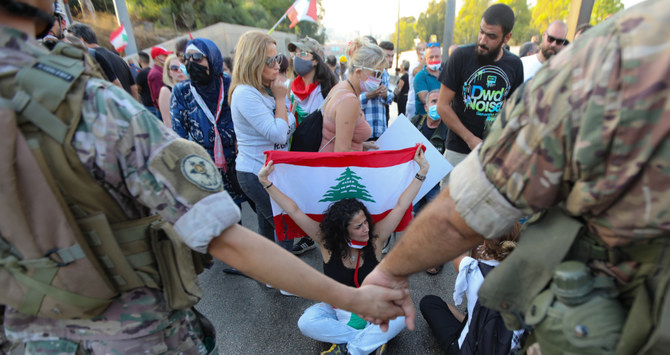BEIRUT: People disabled by the Aug. 4 Beirut Port explosion staged a sit-in on Thursday to protest against “injustice, corruption and marginalization.”
The protest took place in the Basta Al-Tahta neighborhood, where a disabled 87-year-old man called Tawfiq Khawam had set himself alight due to the poverty and neglect he faced. Protesters said they did not want “another Tawfiq Khawam.”
They gave vivid testimonies of the deprivation caused by their disabilities, calling for social protection that guaranteed them “basic rights and a decent living in light of the economic collapse.”
One woman said the port explosion was a “real crime, yet officials act as if nothing has happened.”
She urged the “inclusion of fixed standards for the rights of the injured who have suffered a physical disability in the process of rebuilding the destroyed buildings of Beirut,” and for the need to include the issues of the disabled in the reform plan and to treat people who were disabled as a result of the explosion and the army's wounded equally without discrimination.”
The spokeswoman for the protesters said Lebanon had issued a law about the rights of disabled people 20 years ago, but that parliament had not yet ratified the International Convention on the Rights of Persons with Disabilities despite 14 years passing since it was issued.
This, she added, was a sign of how Lebanese officials dealt with this category of citizens, who had become “victims of extreme poverty, dreaming of food and medicine and access to public places.”
The protest coincided with an official announcement that President Michel Aoun had signed a law to provide compensation and salaries to the families of the port explosion victims, and “enabling those who were disabled to benefit from health benefits from the National Social Security Fund and from the law related to the rights of people with special needs.”
A study from Beirut Arab University, in cooperation with the Lebanese Army Engineering Directorate and published on Thursday, showed that the blast resulted from the explosion of only 20.5 percent of the 2,750 tons of ammonium nitrate that were stored near grain silos.
The study said the exploded amount of ammonium nitrate was “much less than the total original quantity, which is equivalent to 220 tons of TNT or the equivalent of 564 tons of ammonium nitrate.”
The judicial investigator has not issued his report, which is expected to reveal the reasons for the explosion.
The blast killed 202 people and injured more than 6,500, some of whom are still in hospital. It destroyed Beirut’s waterfront and inner residential neighborhoods, and came as the country was dealing with a financial crisis and COVID-19.
A British government minister warned on Thursday that Lebanon was on the verge of not being able to feed itself.
James Cleverly, the Foreign Office minister for the Middle East, called the situation “a man-made problem which could have been prevented.”
“The most pressing danger is the risk to food security: Lebanon is on the verge of not being able to feed itself,” said Cleverly, who met Lebanese officials in Beirut on Thursday. “Four months on from the blast, Lebanon is threatened by a silent tsunami. Lebanon's leaders must act.”
During a second international conference in support of Beirut and the Lebanese people, held on Wednesday at the invitation of French President Emmanuel Macron and UN Secretary-General Antonio Guterres, the international community expressed concern about the delay in the investigation of the port explosion.
Participants said the commitments made regarding emergency aid since Aug. 4 had been fulfilled, in terms of quality and quantity, in all priority areas identified by the UN at the time.
The conference announced a multi-donor trust fund prepared by the World Bank, the UN and EU, to continue funding after the emergency humanitarian aid allocated after Aug. 4, provided that “an important role is given to civil society actors to identify priority areas of action, such as good governance, health, education, social protection, housing, culture and heritage.”
Participants also expressed their concern about the “deterioration of all economic, financial, monetary and social indicators, as the poverty rate increased from 28 percent to 55 percent within a 12-month period, which has now pushed many Lebanese to emigrate.”
They said that while Lebanon was in a state of financial bankruptcy, it could still be a successful country if the reforms that the population and international community expected were implemented quickly.
















